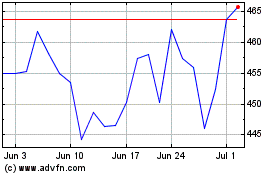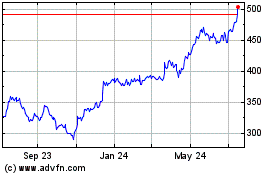By Liz Hoffman
Goldman Sachs Group Inc. said Monday that Harvey Schwartz, one
of two heirs apparent to Chief Executive Lloyd Blankfein, would
leave the firm, setting up David Solomon as its next CEO.
Mr. Schwartz will retire on April 20, and Mr. Solomon will
become the sole operating chief and president. The two men were
jointly elevated to the roles in December 2016, in direct
competition for one of the most-coveted jobs on Wall Street.
The Wall Street Journal earlier reported that Mr. Blankfein
could retire as soon as year-end and that Messrs. Schwartz, a
karate black belt and former trading chief, and Solomon, an
investment banker who DJs on the side, were the top contenders to
succeed him.
The two men were told by Mr. Blankfein last week that Mr.
Solomon, 56 years old, was likely to be the firm's next CEO,
leading Mr. Schwartz, 54, to announce he would leave, according to
people familiar with the matter. The decision was shared with
Goldman's management committee, a group of about 35 top executives,
Monday morning.
Goldman shares traded up about 1%.
Power at Goldman has tended to swing from bankers to traders.
When Mr. Blankfein, a former trading chief, took over in 2006, that
business was dominant. Since the financial crisis, though, trading
has faltered.
Seeking growth, Goldman has pushed into new businesses like
consumer banking and low-fee index funds. Many inside the firm
believed those changes favored Mr. Solomon, who is known less as a
superstar deal maker than as a strong manager, able to prune dead
weight, motivate strivers, and marshal Goldman's resources behind
big initiatives.
He is credited with professionalizing Goldman's
investment-banking division, which he ran from 2006 to 2016. He had
a policy of giving zero bonuses to the bottom 5% of employees,
according to executives. But he also spearheaded Goldman's efforts
to lighten the workload for junior bankers and worked to recruit
and promote more women in the division's ranks.
He also has pushed Goldman to get bigger in debt-financing,
which is now a central pillar of its $5 billion growth plan.
"David is a pied piper, and I mean that in the best way," said
Chris Nassetta, CEO of Hilton Hotels Corp., who worked with Mr.
Solomon at Bear Stearns. "People want to follow him."
Mr. Solomon started on Wall Street in the mid-1980s, selling
commercial paper at Drexel Burnham Lambert. Off duty, he played
social planner to a group of college friends, organizing casino
outings in Atlantic City and summer rentals in the Hamptons, where
roommates would wake up to find him mowing the lawn.
After a stint at Bear Stearns, Mr. Solomon joined Goldman as a
rare outside partner in 1999 and set about to build a high-yield
debt business.
During the decade Mr. Solomon ran Goldman's investment-banking
division, the unit's revenue rose 70% and its share of profits more
than doubled.
Mr. Schwartz, meanwhile, embodied Goldman's profitable past,
having followed Mr. Blankfein up the ranks of its trading division.
As finance chief from 2013 to 2016, he navigated the regulatory and
market forces that reshaped postcrisis banking. He is seen as
strongest in the areas of risk-management and regulation.
Mr. Schwartz graduated from high school in New Jersey with
grades so poor he didn't bother applying to college, he said on a
Goldman podcast last year. He eventually attended Rutgers
University, working as nightclub bouncer and other odd jobs to pay
his way.
He joined Citigroup Inc. as an operations temp in 1989 and came
to Goldman in 1997 as a derivatives salesman, hawking instruments
that protected commodity companies from price swings.
By 2008, Mr. Schwartz was running the trading division. As the
financial crisis unfolded, he kept the firm on the offensive while
competitors pulled back. The gambit worked: Goldman's traders made
$33 billion in 2009, the most profitable year on record for a Wall
Street broker-dealer.
Mr. Schwartz was named CFO four years later. The move was so
unexpected that some senior executives of Goldman's "federation" --
a group that includes areas like risk, legal and accounting --
threatened to quit, according to a person familiar with the
matter.
But Mr. Schwartz won over critics by overseeing an operation
that largely avoided surprises that plagued other banks. His tenure
as CFO is captured in pen on a pair of lime-green boxing gloves
that he keeps in his office: "18-0, all by KO."
In their 15 months as co-presidents, Messrs. Solomon and
Schwartz fanned out across the firm, divvying up responsibility for
its major businesses and top clients.
Mr. Solomon oversees investment banking as well as Goldman's
$1.5 trillion asset-management arm and its operations in India. Mr.
Schwartz oversees trading, Latin America, and areas such as legal,
compliance and risk management. He is Goldman's point man on
clients including Tesla Inc.; Mr. Solomon tends to WeWork Cos. and
Fidelity Investments.
Write to Liz Hoffman at liz.hoffman@wsj.com
(END) Dow Jones Newswires
March 12, 2018 12:34 ET (16:34 GMT)
Copyright (c) 2018 Dow Jones & Company, Inc.
Goldman Sachs (NYSE:GS)
Historical Stock Chart
From Mar 2024 to Apr 2024

Goldman Sachs (NYSE:GS)
Historical Stock Chart
From Apr 2023 to Apr 2024
